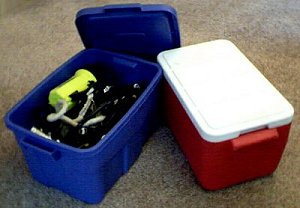Gear Moving & Storage

The standard means of moving and storing dive gear is the dive bag. All of the major manufacturers make dive gear bags. These are often quite fancy, with embroidered logos, pockets inside and out, "ergonomic" handles, and even wheels. Most of these bags are very nice but really too small to hold a cold-water dive kit, and very heavy to carry around when full. These bags are also expensive, a bother to clean, and a lot less waterproof than they claim. Here's is a convenient alternative that is much cheaper:
Go to K-Mart Home Depot and spend $5 on a Rubbermaid tote box, about the size of a milk crate. This will not be big enough to hold all items - you'll have to pack your fins and BC separately - but it will hold everything else, is small enough to fit almost anywhere, and also avoids making a single excessively heavy load. The tote also will not lose small items like a milk crate will. I eventually drilled drain holes in the bottom. I now use my fancy dive bag only to carry my drysuit and its accessories. This type of tote box is the preferred container on every area dive boat I have been on.
You will also want a cooler. Your cooler packs your lunch on the way out, and your catch on the way back. I also use it as a rinse tub for cleaning gear after the dive, and sometimes pack gear in it if it's not full of other things. An 8-gallon flat-top cooler is a good size and makes a nice seat as well. I use reusable freezer blocks instead of ice. These have the advantage of not melting into messy lobster-killing pools of freshwater. Capped-off soda bottles filled with water and frozen solid work just as well, and you can drink them as they thaw.
Packing Checklist
| ____ | mask, fins, snorkel | ____ | camera, film, flash, etc. |
| ____ | BC / harness | ____ | bug stick, pole spear / spear gun |
| ____ | exposure suit, under-suit | ____ | hammer, chisel, crowbar, dynamite |
| ____ | hood, gloves, boots, socks | ____ | u/w writing slate & pencil |
| ____ | regulators, gauges, octo holder | ||
| ____ | tanks, bands, pony bottle | ____ | spares kit, extra batteries |
| ____ | weights, belt, ankle weights | ____ | cooler, ice, food & drink |
| ____ | logbook, c-card, dive tables | ||
| ____ | light ( new / charged batteries ) | ____ | change of clothes |
| ____ | backup light, strobe light | ____ | payment - check / cash |
| ____ | knife, backup knife | ||
| ____ | wreck reel, upline reel | ____ | set alarm clock |
| ____ | catch bag, lift bag | ____ | travel preparations, directions |
Everyone forgets something sometimes. The best way to stay organized and avoid forgetting things is to always pack the same way. After cleaning and drying your gear, replace it in your box or bag , ready for next time. Check again the night before the trip, especially batteries.
